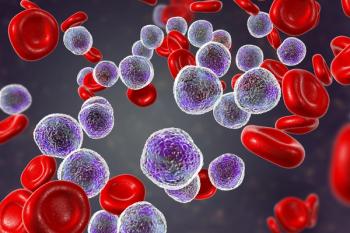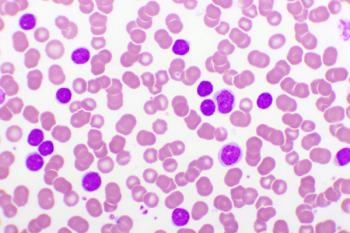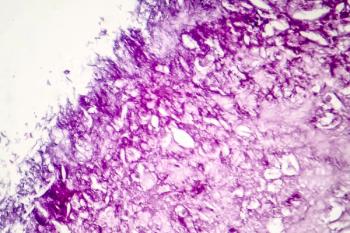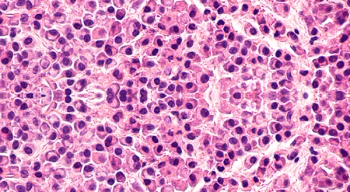
This study found that cancer mortality was higher in counties that experienced persistent poverty compared to other counties, including those currently experiencing poverty.

Your AI-Trained Oncology Knowledge Connection!


This study found that cancer mortality was higher in counties that experienced persistent poverty compared to other counties, including those currently experiencing poverty.

The inherited GATA3 variant rs3824662 was found to strongly influence response to remission induction therapy in childhood acute lymphoblastic leukemia and was also associated with relapse.

Research suggested that limited English-language proficiency is a risk factor for getting potentially lifesaving screening mammograms less often.

Researchers suggested that a scoring system may aid in determining the appropriate use of HSCT in this patient population.

This study suggested that the customized bioinformatics workflow, UroCAD, be used as a noninvasive approach for diagnosis and recurrence surveillance in patients with urothelial carcinoma prior to the use of cystoscopy.

The trial did not meet its primary end point of improved invasive disease-free survival in women with hormone receptor-positive HER2-negative early breast cancer who have residual invasive disease after completing neoadjuvant chemotherapy.

Researchers found that patients who participated in virtual follow-up visits benefitted by spending less time waiting at and traveling to the clinic for in-person appointments.

According to researchers, these results will be important for understanding what factors may be driving mutations in a given cancer and may also possibly point to new therapeutic targets.

A study published in the Journal of Clinical Oncology found that rucaparib can successfully treat patients with metastatic castration-resistant prostate cancer who have mutated BRCA/BRCA2 genes.

Researchers suggested these findings may assist in better selection and prioritization of immune checkpoint inhibitor agents for testing in randomized clinical trials based on phase 2 single arm randomized clinical trial results.

This study found that single dose-per-cycle plinabulin has a similar neutropenia protection benefit as pegfilgrastim among adult patients with non-small cell lung cancer.

Researchers identified molecular and cellular characteristics of anti-CD19 CAR T-cell infusion products associated with how patients with large B-cell lymphoma respond to treatment and experience adverse events.

Significantly more patients treated with nivolumab (Opdivo) plus chemotherapy before surgery demonstrated no evidence of cancer cells in their resected tissue in the trial compared to those treated with chemotherapy alone.

Moss indicated that “we need interventions in these communities to change cancer-causing behaviors, to make cancer screening more accessible, to improve treatment, and to promote quality of life and survivorship.”

This data suggests clinicians should not rely on self-reports from their patients about either their need or the proper interval for a repeat surveillance colonoscopy.

Patients with hematologic disease and a symptomatic COVID-19 infection were found to have a significantly worse prognosis than patients who were nonhematologic with COVID-19.

The study is evaluating sotorasib in 126 patients with KRAS G12C-mutant advanced non-small cell lung cancer who had failed a median of 2 prior lines of anti-cancer therapies.

A study published in JAMA Dermatology determined that topical immunosuppressant medications used to treat adult patients with atopic dermatitis do not increase the risk of common forms of cancer despite warning labels on the packaging.

A study found that the historically higher lung cancer incidence rates for young Blacks compared to Whites in the United States disappeared for men and reversed for women.

The study is evaluating the nivolumab-ipilimumab combination versus nivolumab alone in patients who have had a complete surgical removal of stage IIIb/c/d or stave IV melanoma.

The FDA granted breakthrough therapy designation to IMGN632 for the treatment of patients with relapsed or refractory blastic plasymacytoid dendritic cell neoplasm.

A combination of peritumoral radiomics features appeared to improve the predictive performance of intratumoral radiomics to estimate pathological complete response after neoadjuvant chemoradiation in patients with esophageal squamous cell carcinoma.

A pooled analysis of 3 randomized controlled trials found that pembrolizumab plus chemotherapy demonstrated response and survival improvements with a manageable safety in comparison with chemotherapy alone in PD-L1‒negative advanced non-small cell lung cancer.

This study found that the addition of immunotherapy to radiotherapy was associated with improved overall survival compared with radiotherapy alone in patients with brain metastases who received definitive surgery of the primary tumor site.

The study found that high levels of sustained factor VIII activity, which followed a normalization period after BIVV001 administration, might offer better protection against all types of bleeding and a longer interval between administration of the product in this patient population.

A study found that delaying radiation therapy while remaining on hormone therapy for patients with unfavorable intermediate-risk or high-risk localized prostate cancer to avoid potential exposure to COVID-19 did not negatively impact overall survival.

Mesoblast Limited announced that the FDA issued a complete response letter regarding its biologics license application for remestemcel-L to treat pediatric patients with SR-aGVHD after the ODAC voted 9:1 in favor of the available efficacy and data.

Researchers suggested that the current situation be used as an opportunity to re-evaluate standard practices for clinical trials in order to make them more accessible and less stressful for potential patients and thus allow for broader participation.

The expert from the Otto J. Ruesch Center for the Cure of Gastrointestinal Cancers discussed precision medicine with regard to cancer care, as well as the need to make such care more accessible for the global community.

A study found that radiation therapy to treat childhood abdominal and pelvic cancers potentially caused body composition abnormalities and worse cardiometabolic health for adult survivors compared to the general public.